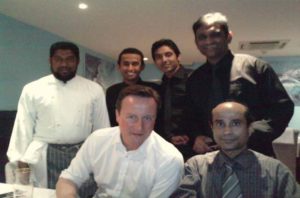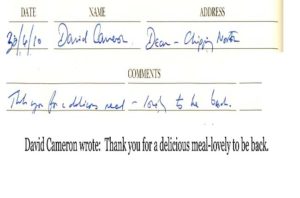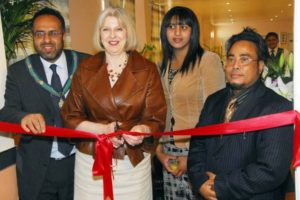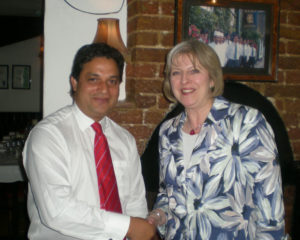An article on the BBC website today, Cars, curry and tortillas’ role in Brexit charm offensive, discusses the diplomacy underway between Britain and the EU:
Food has also been used by Conservative members of the European Parliament to woo their continental colleagues in Brussels, according to the Telegraph. The newspaper reported that they have hosted dinners at the city’s best curry house.
This is particularly appropriate because curry was David Cameron’s last supper, the night before he quit Number 10 Downing Street. The Guardian reported that the order “contained delights such as samosas, Kashmiri rogan josh, a mixed grill and saag aloo (spinach and potato)“. The restaurant that provided the meal, the Kennington Tandoori, is thought to be the first curry house mentioned by name in Parliament.
Curry was one of the battlegrounds in last year’s Brexit campaign. Restaurant owners could be found arguing on both sides. The Bangladesh Caterers Association was in favour of Brexit, whereas the Asian Catering Federation was in favour of remain. Both sides saw immigration rules as the cause of a shortage of curry chefs, but disagreed over whether the issue was the EU. Priti Patel, Employment Minister and leave campaigner, claimed that the EU was a barrier for trade between India and the UK, pointing to a recent ban on Indian mangoes.
In an article in the Evening Standard, published in May 2016, Patel explained how Brexit would save British curry houses:
Uncontrolled immigration from the EU has led to tougher controls on migrants from the rest of the world. This means that we cannot bring in the talents and the skills we need to support our economy. By voting to leave we can take back control of our immigration policies, save our curry houses and join the rest of the world.
She also gave a speech where she said:
It is manifestly unfair and unjust that curry houses and members of our diaspora communities face having to deal with a second-class immigration system while chefs from the EU can waltz into this country and straight into employment.
Patel was not the only politician to make grand promises. In 2016, Brexit minister David Davies hosted theBangladesh Caterers Association’s huge annual dinner, and he promised benefits for every community and that “there will be something for BCA.”
Post-Brexit, things don’t seem to be working out as promised. By January this year, May had refused to increase immigration to support Britain’s curry industry. Curry restaurants continue to close, squeezed by rising costs and staffing issues. In fact, it might have made things worse, with no change to non-EU visas while reducing the number of Eastern European staff, who were covering some of the shortfall (it is estimated 5-6,000 of 150,000 curry workers are Eastern European, and maybe as many as 10,000). The falling pound has also meant higher costs to import ingredients.
In contrast to Patel’s offers, this year’s General Election brought further promises from the Conservatives to reduce immigration, along with a levy of £2000 for every business employing foreign workers.
Restaurant owner Oli Khan felt ‘betrayed’: “It is very disappointing that Brexit campaigners such as Priti Patel and Boris Johnson, who said the curry industry would be better off the EU, have not kept their promises.” Pasha Khandaker, president of the Bangladesh Caterers Association said that, “My organisation supported Brexit for several reasons but the main reason was to bring people from abroad to help our industry to survive.”
It remains to be seen what the effects of this ‘betrayal’ is, but with the referendum won, there is less attempt to communicate with the curry-houses. According to Oli Khan ““We are angry as the Brexit ministers are not responding to our calls, they are not responding to our mails.””




